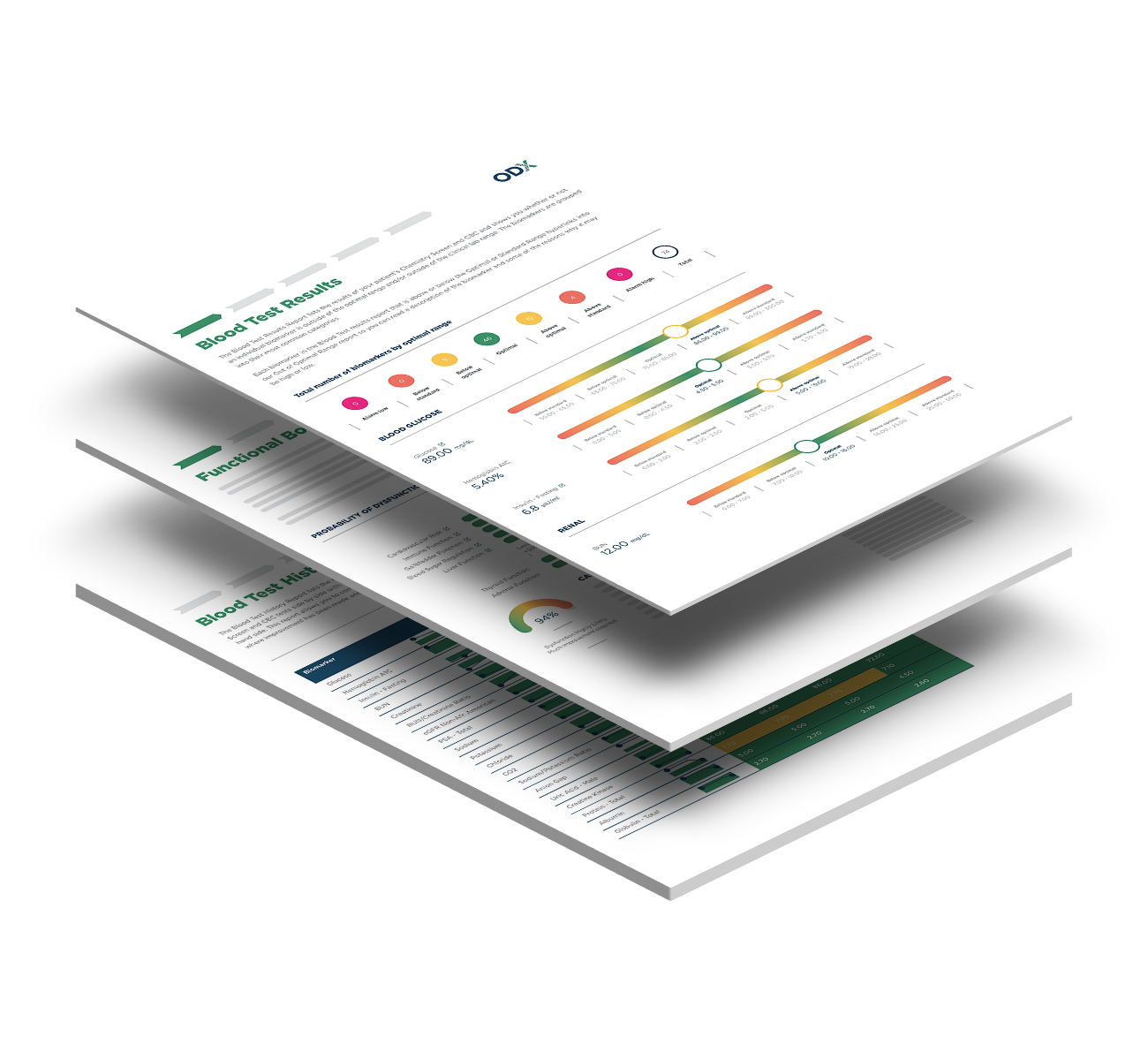Nutritional status and COVID-19
Dicken Weatherby, N.D. and Beth Ellen DiLuglio, MS, RDN, LDN
Though sometimes overlooked, an individual’s nutritional status can determine the competence of their immune system and the efficiency and balance of their metabolism. Therefore, nutrition assessment should be an early and obligatory step in COVID-19 evaluation.
The ODX COVID-19 Series
- COVID-19: The pandemic that has become endemic
- COVID-19: Overlapping risk factors and chronic disease
- Nutritional status COVID-19: A covert factor in disease susceptibility
- COVID-19: Blood chemistry biomarker patterns - Clues and patterns lurking just under the surface
- COVID-19: Blood chemistry biomarker patterns - Down the research rabbit hole
- COVID-19: Blood Biomarkers - Neutrophils
- COVID-19: Blood Biomarkers - Albumin
- COVID-19: BloodBiomarkers - Cytokines
- COVID-19: Blood Biomarkers - Interleukin-6
- COVID-19: Blood Biomarkers - Interleukin-10
- COVID-19: Blood Biomarkers - Vitamin C
- COVID-19: Blood Biomarkers - Vitamin D
- COVID-19: Blood Biomarkers - Zinc
- Biomarker characteristics and blood type - help sharpen the COVID-19 clinical picture
- COVID-19: Initial indications and conventional interventions
- COVID-19: Long-term risk reduction - Naturopathic, functional medicine, and nutrition-based approaches to prevention
- A healthy diet is primary prevention for COVID-19
- You should have a gut feeling about COVID-19
- Beyond dietary food patterns…plant-based compounds may mitigate COVID-19 risk
- Targeted nutrition support in the battle against COVID-19
- Targeted nutrition support in COVID-19: Armed with vitamin C
- Targeted nutrition support in COVID-19: In sync with zinc
- Targeted nutrition support in COVID-19: Micronutrients and phytonutrients are important players
- Optimal Takeaways for improving immunity and reducing susceptibility to COVID-19
- Optimal - The Podcast: Episode 8 -Blood Biomarkers and Risk Factors for COVID-19 and its Comorbidities
A retrospective observational study of 413 hospitalized COVID-19 patients revealed that most patients were at nutrition risk characterized by significant changes in inflammatory markers and nutrition-related parameters. A one-unit increase in Nutritional Risk Screening (NRS) score translated into a 1.23 times greater increase in mortality. Despite these insights, only 25% of the 342 patients with an “at-risk” NRS score of 3 or greater received nutrition support. [i]
Even before overt nutrient deficiency symptoms arise, subclinical insufficiencies can begin to sabotage normal physiological and metabolic function. These include immune response, blood glucose regulation, fat metabolism, antioxidant systems, etc.
A Western-style diet, high in sugar, saturated fat, animal-based products, and highly refined carbohydrate-based foods contributes to the very chronic diseases that increase the risk of severe COVID-19, especially obesity and type 2 diabetes (T2D). Excess saturated fat intake may promote chronic activation of the innate immune system and inhibit the adaptive immune system responsible for antibody protection. Lack of healthy unsaturated fats, fiber, and antioxidants compound the detrimental effects of the Western-style diet.[ii] An unhealthy diet not only compromises physical health but mental health as well.
When considering susceptibility to COVID-19, it should be noted that immune function specifically depends on the sufficiency of several nutrition factors including intake of:[iii] [iv] [v]
- Fresh fruit and vegetable intake (no fewer than 5 servings per day)
- Include citrus fruits, dark leafy greens, yellow/orange produce
- Vitamins A, C, D, E
- B vitamins
- B6 is a cofactor for antibody and cytokine metabolism
- Folate is a crucial factor in nucleotide synthesis and cell proliferation
- B6, B12, and folate are involved in protein and nucleic acid synthesis
- Minerals copper, iron, selenium, zinc, magnesium
- Scientific assessments led to EFSA nutrient function health claims for immune contributions of vitamins B6, B12, folate, vitamin A, beta-carotene, vitamin C, vitamin D, iron, copper, zinc, and selenium.
So, this is just the tip of the iceberg when it comes to nutritional status and COVID-19 susceptibility. Now we can look at blood chemistry clues underlying metabolic dysfunction and increased risk for COVID-19.
Next Up - COVID-19: Blood chemistry biomarker patterns - Clues and patterns lurking just under the surface
Research
[i] Zhao, Xiaobo et al. “Evaluation of Nutrition Risk and Its Association With Mortality Risk in Severely and Critically Ill COVID-19 Patients.” JPEN. Journal of parenteral and enteral nutrition, 10.1002/jpen.1953. 1 Jul. 2020.
[ii] Butler, Michael J, and Ruth M Barrientos. “The impact of nutrition on COVID-19 susceptibility and long-term consequences.” Brain, behavior, and immunity vol. 87 (2020): 53-54.
[iii] Richardson, David P, and Julie A Lovegrove. “Nutritional status of micronutrients as a possible and modifiable risk factor for COVID-19: a UK perspective.” The British journal of nutrition, 1-7. 20 Aug. 2020.
[iv] Naja, Farah, and Rena Hamadeh. “Nutrition amid the COVID-19 pandemic: a multi-level framework for action.” European journal of clinical nutrition vol. 74,8 (2020): 1117-1121.
[v] Fernández-Quintela, Alfredo et al. “Key Aspects in Nutritional Management of COVID-19 Patients.” Journal of clinical medicine vol. 9,8 2589. 10 Aug. 2020.






